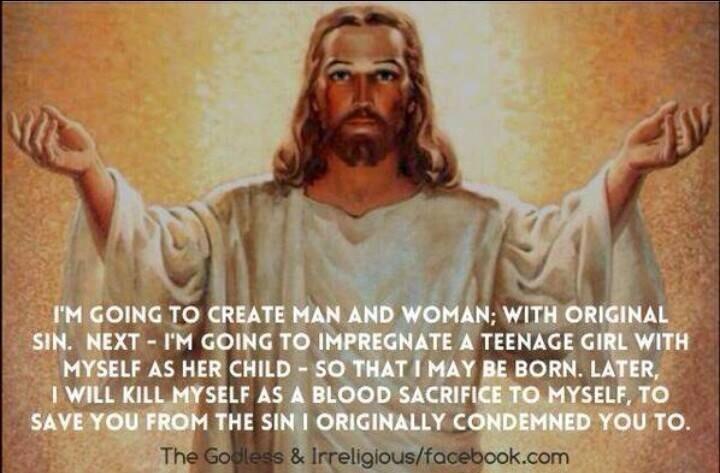Desert Snake
Veteran Member
Yeah so how does your interpretation make sense?word
Welcome to Religious Forums, a friendly forum to discuss all religions in a friendly surrounding.
Your voice is missing! You will need to register to get access to the following site features:We hope to see you as a part of our community soon!
Yeah so how does your interpretation make sense?word
John 1:1
Is calling the pre-incarnate Jesus, God.
So,
Jehovah=God
jesus=God
John 1:10
That is why the name there is God, and isn't the 'pater', or father, or even the Lord.
Jesus is the Lord, 'Lord with us'.

God's word is truth. God is truth. Jesus brings God's word. Jesus is truth.Yeah so how does your interpretation make sense?
Yeah so how does your interpretation make sense?

The verse really is, 'and the word was God'. Your idea isn't literal to the verse, as that is a description. Now, of course you can make an argument, however I disagree.God's word is truth. God is truth. Jesus brings God's word. Jesus is truth.
God's word is life. God is life. Jesus brings God's life. Jesus is life.
God's word is light. God is light. Jesus brings God's light. Jesus is light.
Thusly 'Jesus' Matthew 1:22-24
That is when we encounter 'Jesus', the incarnation of the Lord.

For example, God is Life because he has life within himself. Jesus is life because God has given him also to have life within himself.
On John 1:1c “the Word was God” – What it truly means?
Is Jesus Christ called God
in John 1:1?
An in-depth discussion of the third clause of John 1:1
“The Word was God”
THE proponents of the Christ-is-God theology so confidently affirm that the verse John 1:1 (specially the third clause) expressly supports their belief that one is led to think that this verse explicitly calls Jesus Christ “God.” However, the first verse of The Gospel According to John states:
“In the beginning was the Word, and the Word was with God, and the Word was God.” (John 1:1).
The Greek text of John 1:1 states:
’ἐν ἀρχῇ ἦν ὁ λόγος, καὶ ὁ λόγος ἦν πρὸς τὸν θεόν, καὶ θεὸς ἦν ὁ λόγος.
En arche en o logos, kai o logos en pros ton theon, kai theos en o logos.
In this and in other Greek versions of the Bible, we do not find the name “Jesus Christ” in the first verse of the Fourth Gospel. Also, none of the Bible’s English translation, strictly so called, could be shown to contain the name of Jesus Christ in that verse.
[Note: The Living Bible renders this verse: “Before anything else existed, there was Christ, with God. He has always been alive and is himself God.” But strictly speaking, the Living Bible is a paraphrase. However, its publishers were honest enough to explain in the footnote that the name “Christ” which they insinuated into the verse, is “literally” the equivalent of the term “the Word.” (The Living Bible, special edition, Great Britain: Tyndale House Publishers, 1971)]
Thus, the Greek text, the Greek versions of the Bible, and the English translations of the Bible, strictly so called, do not contain the name of Jesus Christ in the first verse of the Fourth Gospel, the Gospel According to John.
However, the proponents of the belief in the deity of Christ still so confidently believe that this verse (specially the third clause which says “the Word was God”) expressly supports their belief. Hence, let us examine the interpretations and text itself of the third clause of John 1:1 to determine whether or not they are justified in asserting that Jesus Christ is called God in this verse.
WE MUST EMPLOY LOGICAL ANALYSIS “TO DETERMINED
WHAT PROMPTED JOHN’S FAIRLY UNUSUAL SYNTAX”
The English translation “and the Word was God” comes from the Greek “kai theos en o logos.” Professor Millard J. Erickson, author of many boks in Christian theology, says that we must employ logical analysis “to determined what prompted John’s fairly unusual syntax” (Erickson, p. 460).
Note that in the Greek text, the term “theos” (God) comes before the subject of the clause, “o logos” (the Word): καὶ θεὸς ἦν ὁ λόγος (kai theos en o logos/and the Word was God). The key to learn what John might mean is to determine how John used the simple copula (the verb “ἦν”) in θεὸς ἦν ὁ λόγος (the Word WAS God) – to determine the copular relationship of “theos” (God) and “o logos” (the Word).
Erickson cites at least three possible meanings of the verb “ἦν” (“was”) in New Testament Greek in which John wrote to determine what John might mean by the third clause of John 1:1:
“In an Indo-European language like New Testament Greek, there are at least three usages of the simple copula. One is the ‘is’ of conclusion, where the subject is said to be a member of a class. One is the ‘is’ of of predication or of attribution, where a particular quality is predicated of the subject by use of an adjective. The final use is the ‘is’ of identity, where the subject is equivalent with the predicate. This is, in the terminology of logic, a double A-type proposition where ‘All X is Y’ and ‘All Y is X.’ Such propositions are invertible: in other words, there really is no subject and predicate, only nouns in the first and second position.” (Erickson, p. 460)
WHY JOHN WOULD NEVER MEANT IN HIS WRITING
THAT “THE WORD IS GOD HIMSELF” WHEN HE SAID
“THE WORD WAS GOD”
Interestingly, “‘is’ of conclusion” and “‘is’ of identity” are how the proponents of Christ-is-God theoogy interpret the clause “the Word was God” to prove their belief that Jesus Christ is God. For instance, Bruce A. Demarest, in his book says that in this verse:
“John stresses the Logos’ eternal identity with God: ‘and the Word was God’. John wants us to know that the Word was not merely God’s eternal companion; He was in truth God Himself.” (Demarest, p. 25)
Demarest interprets the clause on the basis of his understanding that the copular relationship between the “logos” (Word) and “theos” (God) is that of identification. He interpret the verb “en” (was) as “’is’ of identification.” This is also how many people interpret the clause “the Word was God” which led them to believe that this clause proves that Jesus Christ is “God Himself.”
However, the interpretation that identifies the Word with God is indeed very difficult to defend, because the preceding clause states that ὁ λόγος ἦν πρὸς τὸν θεόν (“the Word was with God”). If it is true that the Word is God Himself (as their interpretation of the clause “the Word was God”), then there must be two Gods, because John 1:1 also said that “the Word was with God” – one “God” (the Word) who is with another God (the God who the Word was with). This is unacceptable with monotheistic people to whom John was writing. John would never contradict what he wrote in John 17:3:
“And this is the real and eternal life: THAT THEY KNOW YOU, THE ONE AND ONLY TRUE GOD, And Jesus Christ, whom you sent.” (John 17:3 The Message, emphasis ours)
Thus, John would never meant in his writing that “the Word is God Himself” when he said “the Word was God” because he will not contradict himself by saying in one part of his writing that “the Word is God Himself” and writing in another that “the Word was with God.” Also, John would never contradict what he wrote that the Father of Jesus Christ is the one and only true God.
All that the Father has He gives to the son. So, how does God give all he has to the son? He does so by giving His spirit in full measure to His son. Full measure means without limit of time. Therefore, anything that can be said of the spirit can be applied to Jesus. For example, in the beginning God created by His spirit word and Jesus is given that spirit word and can therefore be attributed to the creation of God by that word insomuch that he is called "the Word of God".The verse really is, 'and the word was God'. Your idea isn't literal to the verse, as that is a description. Now, of course you can make an argument, however I disagree.
Agree, it's part and parcel of the same belief, that is why, I believe that Jesus sits on the throne, a strange verse as Yehovah is already there, yet the verse isn't metaphor in the sense of 'being like deity', because that isn't how one talks about God. We use literalisms in instances like that.Essentially, Jesus is God in that he represents all that God is. We ought therefore honor the son as we do the Father.
My friend.Who do you think invented the Trinity doctrine?
The first defense of the doctrine of the Trinity was in the early 3rd century by the early church father Tertullian. He explicitly defined the Trinity as Father, Son, and Holy Spirit and defended his theology against "Praxeas", though he noted that the majority of the believers in his day found issue with his doctrine.
Trinity - Wikipedia
Do you even wonder why on the first and second centuries, they did not believe in the Trinity?
1 Corinthians 8:5-7 New International Version (NIV)
For even if there are so-called gods, whether in heaven or on earth (as indeed there are many “gods” and many “lords”), yet for us there is but one God, the Father, from whom all things came and for whom we live; and there is but one Lord, Jesus Christ, through whom all things came and through whom we live.
But not everyone possesses this knowledge. Some people are still so accustomed to idols that when they eat sacrificial food they think of it as having been sacrificed to a god, and since their conscience is weak, it is defiled.
Well, remember you said we will work through isaiah 48?Isa 48 does not speak of the trinity
NO Trinity there
In the post you quoted from me does not speak of John 1:1 at all!Greetings, I don't believe the NIV verse John 1:1 to be wrong.
Are you saying it's wrong?
The question remainsIn the post you quoted from me does not speak of John 1:1 at all!
How did you miss out on that.
We are talking of Isaiah 48
Please go back and clear your confusion.
I do not see any error in John 1 in the NIV.The question remains
It's a translation issue.
The word logos doesn't mean 'word' in the sense we would use it and is very difficult to translate in a concise manner. Perhaps something closer to 'Divine logic' if you have to translate it.
For example.
Philo's Logos as Divine Mediator
Philo of Alexandria's Logos | Old Testament Pseudepigrapha - School of Divinity, University of St Andrews
But logos does mean just word. At least in the Koine Greek.
Can't say I agree that the Christian use of logos simply meant word. It would be very strange if it did given how it is used in numerous other belief systems of the age. Early theologians didn't interpret it as just 'word' either.
